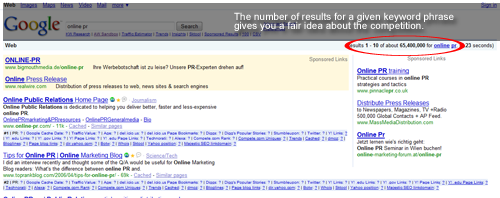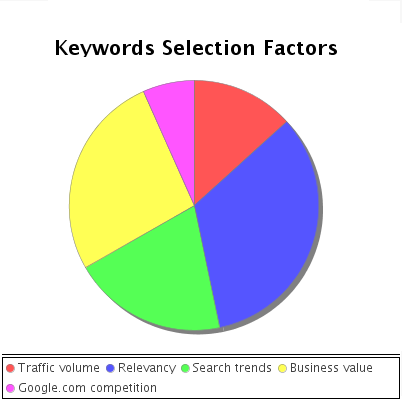 In the first part of the Keyword Research Essentials I made a list of what I consider the best free tools that help both beginners and skilled SEOs select the right keywords for an SEO campaign. Having the right tools, without the right methods to use them, is a waste of time frankly.
In the first part of the Keyword Research Essentials I made a list of what I consider the best free tools that help both beginners and skilled SEOs select the right keywords for an SEO campaign. Having the right tools, without the right methods to use them, is a waste of time frankly.
Do Not Optimize for Keywords that People Don’t Search For: Traffic Volume vs. Google.com Competition
Research tools are great, but they can never replace human intelligence – after all, you are targeting human visitors and not bots. Many SEOs promise high SERP results in 24 hours or less for a given keyword phrase, but is that phrase relevant? Sometimes the keyword phrase in point sounds “good”, but if no one searches for it; there is almost no use for its high rankings. Over the long term it might bring a visitor or two, but in the short term you will face a situation like: “I have top positions for many keyword phrases, but the search engine traffic is very low.” The point is: do not expect traffic for keywords that people never use.
This is where the keyword research tools I mentioned last week come in handy. Before choosing to optimize for a certain term, test it with various keyword popularity tools to see how many visitors might be interested in it; then test the phrase with Google AdWords suggestion tool to get some indication of performance within Google’s advertising network. This helps you gather some performance data, but please be aware the research is not complete without a few “refinements.”
You can see how many sites compete for the same keyword phrase by simply typing it into Google’s search query box. Use Google.com if you target international rankings, and use the local version of Google if your target is in your geographic.
For example, for the term online PR Google.com delivers over 65,000,000 results. This means over 65 million possible competitors, including some of the most powerful public relations sites on the Web.

To optimize a site for a term with so much competition might be tempting, and seeing your site on the first page in Google.com for this term is certainly an “ego booster”, but does this term convert well? The WordTracker tool I mentioned in my last article estimates about 5 daily searches for this term.
![]()
Assuming that your site ranks among the top 3 results in Google.com’s SERPs, out of 5 users who might look for “online pr” on a given day, how many will actually land on your site?
Popular Doesn’t Mean Appropriate! – Business Value vs. Traffic Volume
Starting from the example above, let’s see which is the most popular keyword phrase related to “PR.”
WordTracker also says that “PR Newswire” is the most popular term, with over 400 searches daily. Obviously, if you run a PR site you would like to capture some of the potential traffic for this term.
Google.com says that there are only 29,300,000 sites competing for the term – obviously much better than over 65,000,000 for “online PR.”

But, is it appropriate to optimize for PR Newswire? No. PR Newswire is a well known press release distribution vendor, or in other words a well known brand. Unless you are affiliated with PR Newswire, optimizing for this term is pointless: you might get the traffic, but it will not convert. When you choose a keyword phrase keep in mind what your users want and whether that phrase is relevant for your own site.
It’s hard to “guess” what a user wants, but the keyword research tools do provide a lot about what users are looking for. A search for PR Newswire indicates clearly that the users wants to find www.prnewswire.com or reviews about the company. A search for “online PR” is too nebulous: the searcher might be looking for general information, definitions, or even a company specialized in this field. In contrast, a search for “PR Prices” might indicate a users looking to buy PR services, or a PR apprentice researching the PR industry.
From this short analysis we can conclude that one of the most important factors when choosing a keyword is the “business value” – meaning how the term will convert for your business.
Be Specific and Comprehensive: Relevancy
When users search for specific products online, they try to refine their searches by typing in longer keyword phrases, getting closer to the “semantic search” ideal from a behavioral stand point. These “longer” key phrases hold higher relevancy than generic terms. Let’s see a “refined” version of a search containing “PR” – our “root” keyword for the day.
A customer running a law company will most likely type in “pr for law firms” – which is a “long tail” keyword phrase, assuming that you offer pr for law firms.
This phrase is very specific to what you are selling, and it will probably convert a visitor into a customer. Conversions depend on a large number of factors, not only on keyword choice – but we will discuss this another time.

Relevant and highly specific keyword phrases rank faster and easier than generic keyword phrases, and the competition is usually less daunting. Generic keywords do bring more traffic, but the conversion rates are very low. Unless you depend on traffic stats to monetize your site, it might be a better idea to go for relevancy rather than the market value.
Nothing Lasts Forever: Search Trends
It’s hard to predict what search users will be looking for in the next season. Sometimes search traffic fluctuates based on trends that are influenced by economical changes, season, fads and etc. It’s always a good idea to check out a keyword trend tool to determine what’s hot and what’s not. Recommended: Google Insights for Search.

To see what’s “hot” with our “root” term, simply type in the Google Insights query box your term, then refine the search by selecting the appropriate time range and a relevant category. For “PR” in 2009, business, we note that the top searches are marketing pr, jobs pr, pr firms, media pr, etc, while a very important “rising” search is social media pr. The rise of the “social media pr” is no accident, considering the actual Web trends. Although WordTracker and other keyword suggestion tools show low daily traffic estimates for most of the “rising” search terms, remember that there are many situations where software cannot replace human intelligence. Always watch the market trends and use the rising keywords phrases to your benefit.
Conclusion
So, tools are essential for optimizing the selection of keywords for SEO value, but they are only effective if used properly. It is also important to understand that search engine relevance is a two way street. Google is trying to supply the most relevant results, search users want these relevant results, and viable businesses want to “be” relevant for potential customers. Ranking without relevance can only produce “visitors”, not long term customers. Keyword selection based on human logic and experience, refined and narrowed with the right tools, is the correct methodology for selecting the most suitable keywords.



